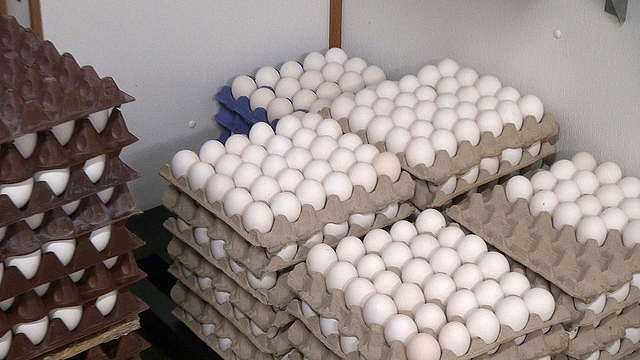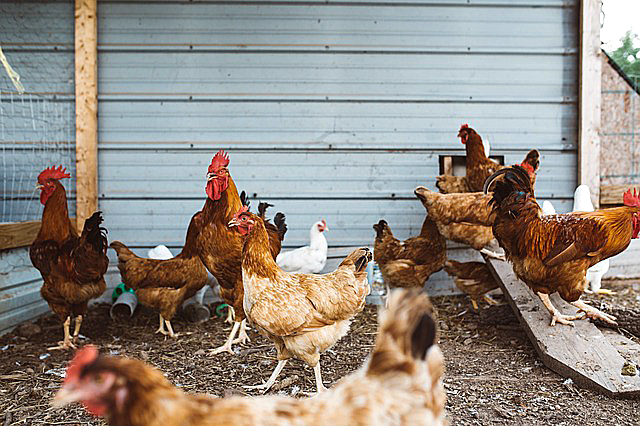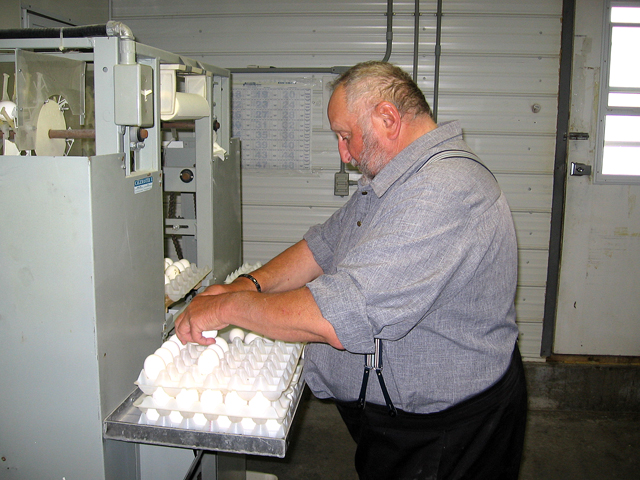A Hutterite colony in Southcentral Alberta is developing a net-zero egg layer barn, a large chicken facility that hopefully will use no more energy than it generates. A feature in The Western Producer, a weekly publication for the agricultural industry of Western Canada, covered the development of the experimental barn on the Brant Hutterite Colony near Brant, Alberta, 40 miles south of Calgary.

A similar report has been published recently about the Green Acres Hutterites, also located in Southern Alberta, who have adopted solar energy enthusiastically at their colony. To judge by photos posted on Flickr about the Green Acres colony, they are evidently producing eggs in a solar powered chicken barn. The Brant Colony is developing the energy efficiency of its chicken barn several steps farther.
The new barn at the Brant Colony has 12,800 laying hens that are bathing in the dust and laying their eggs while technical equipment is trying to monitor their energy expended and their energy produced. It is not clear if the new barn is fully energy net-zero yet, however—not all the systems are operational and data collection from the experiment is not complete.
The barn has Internet access to provide remote monitoring of energy usage, with a camera in the laying area that provides a live feed. It has 100 solar panels on the roof that produce 25.5 kilowatts of energy. It has 14 inches of insulation in the attic, walls that are heavily insulated, and a ventilator that recovers heat. The building has a six-inch thick concrete floor with heating in it. The design seeks to control efficiently the collection of dust and the management of humidity.

From the perspective of the chickens, perhaps the best feature of the new barn is that the birds are not kept confined in cages, as they are at many factory-like chicken operations. Instead, they are allowed to range freely, at least inside the barn. The egg manager for the colony, Darrel Mendel, said that he was initially skeptical about the idea of the colony participating in the net-zero egg barn experiment. He thought about the proposal in 2014 and “just put [it] underneath a stack of books or something.”
But the colony was planning to modify and expand its egg production operations, and it decided to go for free-run eggs when major food companies announced that they would be making changes away from accepting eggs from caged birds. At the same time, the Egg Farmers of Alberta selected the Brant Colony as the best possibility in the province for its net-zero experiment. The colony was awarded a $250,000 grant from the Growing Forward 2 program, a Canadian government initiative that funds innovative projects in the agricultural sector, to help the development of the net-zero barn.

“There’s always new ideas to explore, and it is truly an adventure being an egg farmer,” said Mr. Mendel about his work as chicken manager. But routine as the work of managing a layer operation might seem to be, officials in Alberta are impressed with what the Brant Colony is doing.
Jenna Griffin, the Development Officer for the industry group Egg Farmers of Alberta, spoke about the impact that the development at the colony will have on the future energy efficiency of agricultural operations in Canada. “By agreeing to work at overcoming the obstacles and to share extremely detailed information about their facility and its performance, Brant Colony is serving the industry, acting as stewards and knowledge brokers,” she said.
She added that the egg industry was growing in Alberta and farmers were building new facilities to keep up. Whether net-zero is actually attained at Brant, the colony is leading and learning in the process, she said.